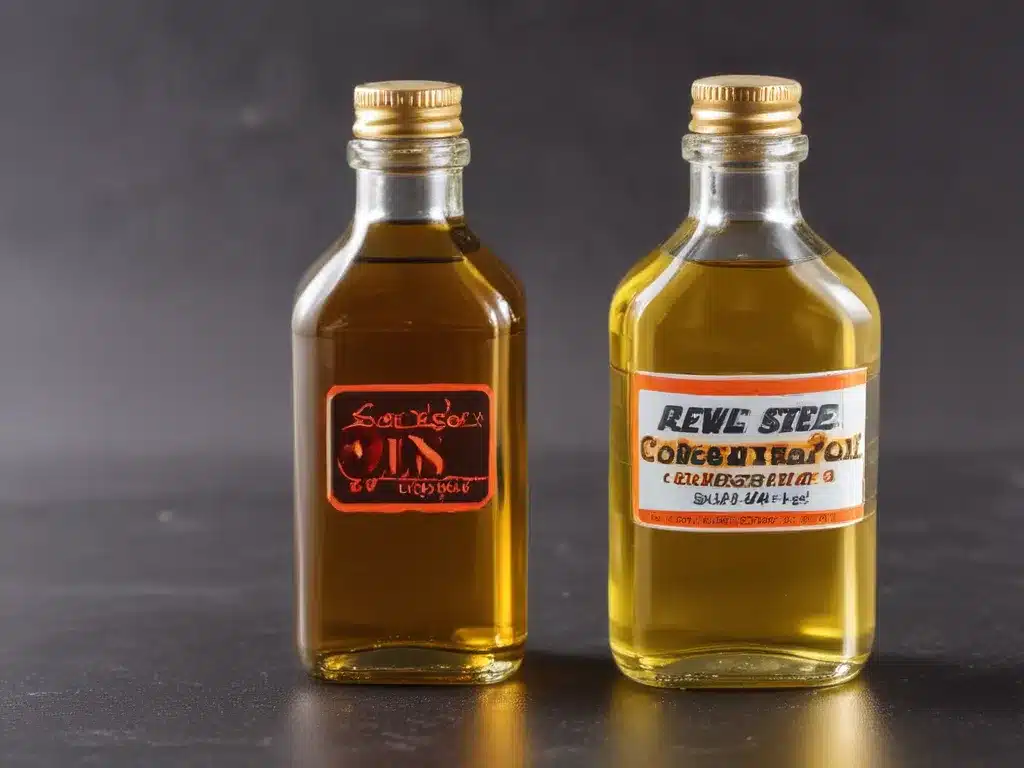
The Age-Old Debate: Synthetic vs Conventional Oil
I remember the days when my dad would religiously change the oil in his old pickup every 3,000 miles. He’d pop the hood, drain the used oil, and refill it with the good old conventional stuff. Back then, that was just the way it was done. But these days, the automotive landscape has changed dramatically, and the choice between synthetic and conventional oil has become a heated debate among car enthusiasts and mechanics alike.
As someone who’s been a bit of a gearhead my whole life, I’ve had my fair share of experiences with both types of oil. And let me tell you, the differences between them are pretty darn significant. It’s not just a simple matter of price or convenience – the performance and protection capabilities of these two oils can be worlds apart.
Diving into the Details: What’s the Difference?
Conventional oil, the kind my dad used to swear by, is a refined crude oil that’s extracted straight from the ground. It undergoes a basic refining process to remove impurities and improve its lubricating properties. Synthetic oil, on the other hand, is a man-made lubricant that’s engineered in a lab to have a more uniform molecular structure and a higher level of purity.
So what does all that mean in practical terms? Well, the molecular structure of synthetic oil allows it to flow more easily, especially in colder temperatures. This means your engine will have an easier time starting up on a frosty winter morning. Synthetic oil also tends to be more resistant to breakdown under high heat and pressure, which is crucial for maintaining engine protection during those long, grueling drives.
Moreover, synthetic oils often contain additional additives that enhance their performance even further. These additives can help to reduce friction, prevent buildup of sludge and deposits, and even improve fuel efficiency. Conventional oil, while still a reliable option, just can’t match the level of engineering and precision that goes into a good synthetic blend.
The Pros and Cons of Each
Now, I know what you’re thinking – if synthetic oil is so darn superior, why wouldn’t everyone just use it? Well, as with most things in life, there are trade-offs to consider. Let’s take a closer look at the pros and cons of each type of oil:
| Synthetic Oil | Conventional Oil |
|---|---|
| Pros: – Improved engine protection – Better performance in extreme temperatures – Longer service life – Enhanced fuel efficiency |
Pros: – Generally more affordable – Easier to find at any automotive store – Tried-and-true formula that’s been used for decades |
| Cons: – Higher upfront cost – Can be more difficult to find at some retailers |
Cons: – Less effective at protecting the engine – Shorter service life – Poorer performance in extreme temperatures |
Ultimately, the choice between synthetic and conventional oil comes down to your personal preferences, driving habits, and budget. If you’re the type of person who likes to keep their car running in tip-top shape and you don’t mind spending a bit more, then synthetic oil is probably the way to go. But if you’re on a tighter budget or you don’t put a ton of miles on your vehicle, conventional oil can still be a perfectly decent option.
Real-World Comparisons: Putting Oils to the Test
Of course, the only way to really know which oil is better is to put them to the test. I’ve had the chance to experiment with both types of oil in my own vehicles, and I’ve got to say, the results have been pretty eye-opening.
For example, I used to have an old Civic that was starting to show its age. It had over 150,000 miles on the odometer, and the engine was sounding a bit…shall we say, “seasoned.” I decided to switch it over to a high-quality synthetic oil, and within a few weeks, I noticed a dramatic difference. The engine was running smoother, it was quieter, and I even saw a slight uptick in fuel economy.
On the other hand, I’ve also had the misfortune of owning a couple of cars that were just maintenance nightmares. In those cases, even the best synthetic oil in the world couldn’t save the engine from the ravages of neglect and abuse. The moral of the story? No matter which oil you choose, proper maintenance and care is still the key to keeping your ride running strong.
The Bottom Line: Synthetic Oil is the Way to Go
After all my experiences and research, I’ve come to the conclusion that synthetic oil is generally the superior choice for most modern vehicles. The enhanced protection, improved performance, and longer service life just can’t be beat. Sure, it might cost a bit more upfront, but in the long run, it’s a small price to pay to keep your engine healthy and happy.
Of course, there may be some cases where conventional oil is still the better option. If you’ve got an older car with high mileage, for example, the thicker viscosity of conventional oil might actually be better suited to its needs. And if you’re really strapped for cash, a conventional oil change is definitely the more budget-friendly choice.
But for the vast majority of drivers out there, I’d highly recommend making the switch to synthetic. It’s just a smarter investment in the long-term health and longevity of your vehicle. And hey, if it’s good enough for my dad’s old pickup, it’s probably good enough for your car too!
So there you have it – my deep dive into the world of synthetic vs. conventional oil. I hope this has helped to shed some light on the debate and given you a better understanding of which option might be the right fit for your ride. Happy motoring, my friends!


